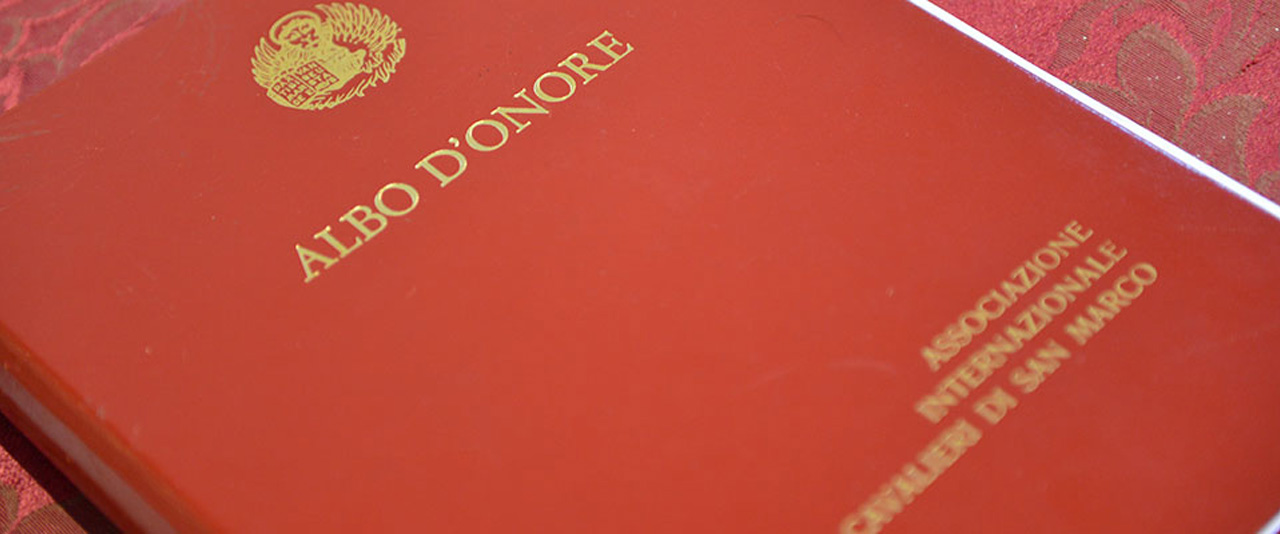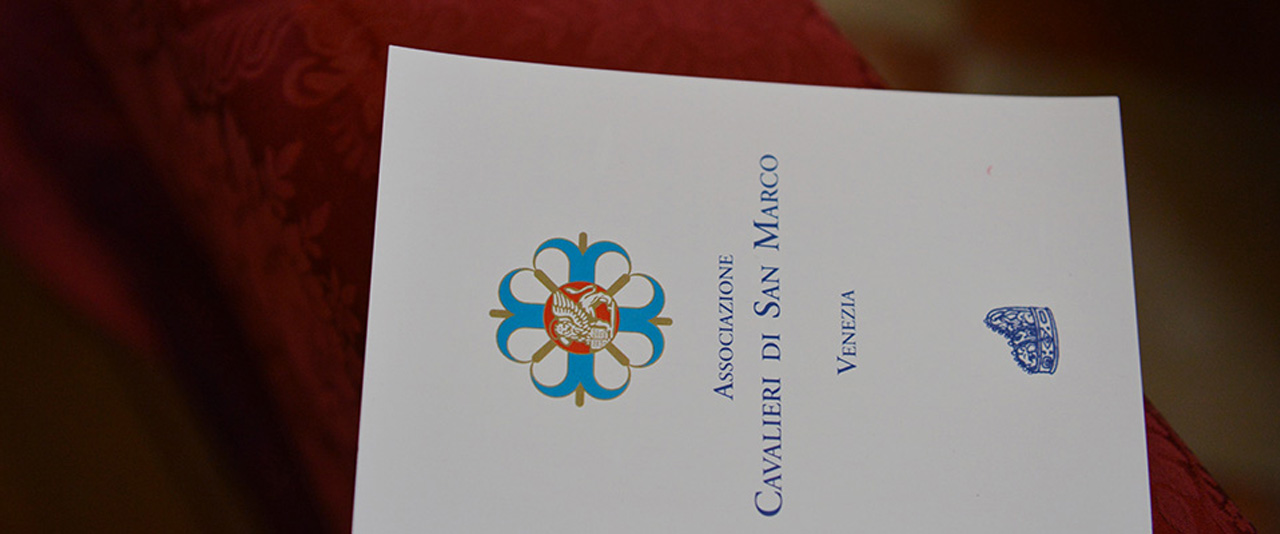Statute
STATUTE
1° The International Association of Knights of Saint Mark – formed by act nr 147/5 registered in Venice a.p. 1092 dated March 2nd, 1970 – rectifies its name into “Association of Knights of Saint Mark” with premises in Venice.
2° The Statute of the Association “Knights of Saint Mark” approved by the deed of incorporation modified by assembly decisions made on 30/3/1980, 22/3/1981 has been replaced by the present text.
3° The Association is a non profit one, it was founded for charitable, religious, social, moral, humanitarian and cultural purposes. It is a free, apolitical Association that does not represent in any way an equestrian association and it does not confer any honor nor any other recognitions of that kind on anyone.
4° In compliance with the provisions of the preceding Article, the members of the Association cannot use the equestrian or the knight title. Any behavior contrary to these rules constitutes grounds for immediate expulsion as a member of the Association.
Purposes
5° In particular, the Association proposes the following aims:
5.1 -to indicate:
a – those who work in any area for the safeguard and prosperity of Venice;
b – those who work for helping others and for charity.
5.2 – those who concretely help others:
a – through the efforts of a presence in society that places itself at the service of maintaining human dignity;
b -through charitable and welfare works;
5.3 – to help encourage the Association and the Members to participate in the programs and activities of the Church.
5.4 – to conduct meetings among Members with the participation of Ecclesiastical Advisers in the spiritual formation of the Members themselves;
5.5 – to participate as a group in public ceremonies;
5.6 – chains, badges and white hooded capes are symbols of Membership and cannot therefore be used in contrast with any social affinities.
Members
6° The Members of Association of Knights of Saint Mark are such since 13/3/1994, as well as Italian (and other nationalities) Citizens, of the Catholic Christian religion, those who are able to serve the Association purposes and whose application for kinghthood has been accepted by the board of directors in accordance with the procedures laid down in Regulation.
The Members must observe the Statute and Regulation and have to pay the dues established by the Assembly decided by the board of Directors. Voluntarily and freely the Members can make donations to charities and conservation of artistic works or monuments in Venice.
The board of Directors is in charge of the organization of public ceremonies for the acceptance of new Members in the Association. These ceremonies – that don’t have to take place during the celebration of Holy Mass if the chosen location is a church – will remind everyone of the ancient Knights of Saint Mark in the days of the Serenissima Republic, though freely inspired.
A Member will lose membership due to resignation, non-observance of Articles 3-4 or due to expulsion proposed by the board of Directors upon compulsory advice by the arbitration board and approved by the Assembly (according to the Article 24/3° paragraph of the Civil Code).
ASSOCIATIOB BODY
7° The Body of the Association is made up of the Assembly, the Board of Directors, the Auditors’ Committee, the Arbitration Board
Assemblies
8° The Members Assembly can be ordinary or extraordinary. The ordinary Assembly decrees on the budget, the appointments of Directors, Auditors, Arbitrators and on the report of the board of Directors.
The extraordinary Assembly deliberates on the Statute and Regulation changes, as well as on the Assembly dissolution.
The ordinary Assembly is convened by the board of Directors once a year, before March 31 with a written communication to each Member who has regularly paid the membership fee at least 20 days before the Assembly date and posting the notice of the meeting enrollment at the registered office of the Association.
The Members who are regularly enrolled by Dec 31 of the previous year and regularly pay the membership fee can vote if they take part in the Assembly.
The Assembly on its first call is valid when there are the half of the members plus one and then is entitled to vote.
The Assembly on its second call (that can be arranged on the same day after one hour at least from the first call) is valid regardless of the number of members entitled to vote.
The extraordinary Assembly is convened by the board of Directors with the same procedures as for the ordinary Assembly, except for the case of the agenda containing the proposed dissolution of the Association. In this case during the Assembly in its second call at least 75% (3/4) of the Members entitled to vote have to participate.
Both assemblies (ordinary and extraordinary) are convened upon request of 10% at least of Members entitled to vote.
Board of Directors
9° The board of Directors is made up of 11 members elected by the Association and they are in charge for three years.
The Directors cease from office for:
a – voluntary resignation;
b – expiration of term;
c – for deliberation rated by at least 7 directors in the event that the Director is unjustified absent for at least three sessions without giving reasons for the absence.
In case of vacancy, the Director resulting first among non-elected ones will be co-opted and will hold office until office expiration of the entire Board of Directors. In case of a tie of two or more non-elected members, co-optation is unquestionably made by the Board of Directors.
Resolutions concerning people have to be taken by secret ballot under penalty of nullity.
The Board of Directors shall appoint as its own Members:
a – the President;
b – the General Secretary, also called “Cancellier Grando”;
c – the Treasurer, also called “Provveditor Grando”;
d – according to the needs, the Board of Directors has the power to appoint local clerks whose duties are defined in Regulation
The President:
a – directs the Board of Directors and the Members Assembly;
b – is responsible for the implementation of the above;
c – can appoint one or more Vice Presidents within the Board of Directors.
Statutory Auditors
10° The board of auditors is made up of three members and two substitutes who will have to be chosen among people who are adequately professional and appointed by the Assembly for three years.
The Board appoints a President and it is in charge of controlling the administration and accounting in the Association; in particular:
a – the board checks the book keeping and administrative documents;
b – the board compiles a report for the Assembly;
c -it ensures the consistency of the cash desk and the assets of the company;
d – proceeds with inspection acts.
Board of Arbitrators
11° It is made up of three members and two substitutes elected by the Assembly and holds office for three years. The board:
a – appoints its own President;
b- shall rule on disputes between members or between members and organs of the Association;
c – delivers its compulsory and binding opinion on any proposed expulsion of members proposed by the Board of Directors;
d -judges ex aequo et bono without formalities.
Assests
12° The assets of the Association are derived from:
a – capital funds;
b – bank deposits;
c – any legacies and donations;
d -any offers and donations for institutional purposes;
e – any loans for shares or other;
f – any amounts owed to suppliers or third parties;
g – furnitures;
h – facilities;
i – office equipment;
l – any other property owned by the Association.
Miscellaneous Provisions
13° Provisions: any member of the social bodies is obliged to participate at all meetings as per the Statute or Regulation.
13.1 In case of impediment, one of the assigned substitutes will replace the member of Board of Auditors and Board of Arbitrators.
13.2 Should any of the members of the social bodies miss three meetings without justifiable reason this could cause the exclusion from office.
14° Badge and Motto of the Association
The badge of the Association is constituted by a bifurcated cross at the end, of blue enamel and edged with gold. In the middle the lion of Saint Mark, is in gold too. The motto of the Association is “Esto Civis Fidelis”.
15° In case of dissolution or withdrawal from the Association, the assets – as reflected in the accounting records at the time of termination – will be donated to charity organizations operating with similar goals.
16° Any amendments to this Statute shall enter into force after approval by the Assembly.
17° The extent not covered by this statute refers to the rules of civil law applicable to free associations.
REGULATION
Members
Art. 1 – Members
Applications by future members-to-be must be accompanied by the proposal for admission by a Member guaranteeing the civil and moral qualities of the future members by signing the application form accompanied by the “Curriculum Vitae”. In special cases, the initiative may be taken directly by the board of Directors.
The proposing Member takes care of the application that has to be submitted to the Executive Council who unquestionably decides by secret ballot, after consulting the Committee for the extensions as per Article 10.
ASSEMBLIES
Art. 2 – Members Assembly
The Ordinary Assembly, further to the declaration of validity according to the statutory requirements, adopts its resolutions, in particular:
2.1 – annual budget advisory concerning the financial year, the duration of which coincides with the calendar year and submit to the Assembly the budget of expenditure within the limits set by the previous Art.8;
2.2 – on the report of the board of Directors;
2.3 – sets out the measures of the annual contribution of the social partners;
2.4 – elects, at the expiry of their term or upon termination of their appointment, the members of the board of Directors, the board of Auditors or of Arbitrators. These bodies will have to be voted and elected with separate lists;
2.5 – shall decide on any other topic that is not under the responsibility of the extraordinary Assembly. The extraordinary Assembly, once it has been declared valid according to the statutory requirements, resolves:
a – the approval and amendment of the Statute and the Rules;
b – the dissolution of Association by the presence of at least half plus one (50% + 1) of the Members on its first call and 20% on its second call;
c – the approval of the appointment of Honorary President and the supporting members.
Each Assembly shall appoint from among its members a Secretary and it approves or modifies the composition of the Commission verifying the powers of the previously appointed scrutinizers. In addition, in the event that the President of the Association does not attend the Assembly, the Assembly itself nominates one among the members.
Failure to approve the annual report and / or the report of the Board of Directors determines the end of the Board.
Art. 3 – The Board of Directors
The Board of Directors meets at least once a month.
3.1 – implements the statutory rules and regulations and carries out the decisions of the Assembly;
3.2 – constitutes the Presidency Council among its members which consists of the President, two Vice Presidents, the Secretary General and the Treasurer;
3.3 – decides on the annual budget estimate and advisory statements and on the report to be submitted to the Assembly;
3.4 – work collegially and act by a majority. The President’s vote shall prevail in case of a tie. The Presidential Council has the task of studying and instructing documents and proposals which will then be definitively resolved jointly by the board of Directors.
Art. 4 – The President
The President represents the Association with all the authorities and third parties, he coordinates the activities of the Association and he is responsible for the smooth running of the Association.
The President presides over the meetings of the Executive and Presidential Council.
Art. 5 – General Secretary or “Cancellier Grando”
The General Secretary is head of the Secretariat of the Association and he prepares, in collaboration with the treasurer, the financial and account statements to be submitted to the Executive Council and the Assembly.
He also keeps the inventory of assets and holds the archive and social documentation.
Art. 6 – Treasurer or “Provveditor Grando”
The Treasurer is the consignee of the cash desk and he is responsible for any bank and post accounts on the understanding that withdrawals must be made with at least two signatures, one of the Treasurer and one of the President or the Secretary General.
The Treasurer shall ensure the collection, relating to the payment in the current account of the offers and the annual dues. It also provides for the payment of expenses approved by the Board of Directors
He also manages the fund of small expenses accounting for to the Executive Council.
Art. 7 – Auditors
The auditors of the Accounts are convened by their President to meet every three months at least.
Art. 8 – The Board of Arbitrators
They meet upon request of the board of Directors or convened by their President whenever the intervention of the Board is required in accordance with the by laws .
Art. 9 – Chancellors of the area
In the event that the board of Directors appoints ” pro-tempore ” Chancellors of the area, their tasks will be to collaborate with the board of Directors, by participating on committees , collecting applications from applicants that are not submitted directly to the board of Directors and forwarding them to the Council . They can also be appointed by the board of Directors to gather information on future members-to-be.
Art. 10 – Commission for extension
The board of Directors shall appoint a committee of three members chosen among the Directors, Registrars and Members, to instruct the practice of accepting new candidates by applying the final relevant proposals, after achieving, where appropriate, the necessary supplementary information.
Art. 11 – Various Commission
The Board of Directors may establish in its midst or among the Members, committees on education and the study of specific issues and problems pertaining to the activities of the Association.
Art. 12 – Miscellaneous Provisions
Before the expiry of three years, the outgoing President shall invite the Members to put their possible applications which must be submitted at least sixty days before the date of the convening of the Assembly regarding who will proceed to the elections.
The lists of candidates must be disclosed at least twenty days before the election date to Members.
Members to whom the Assembly or the Executive Council have given an assignment, are required to attend the meetings which they are summoned to.
The Directors, Auditors, Arbitrators and members of committees must submit a reasoned justification in case of absence from meetings .
All offices are carried out free of charge.
In case of absence of Auditors or Arbitrators, they are replaced by substitutes only during the days of absence.
The distinctive mentioned in article 14 of the Statute has the sole purpose of proving the membership of the Association and may not be used for reasons other than social objectives with particular regard to the provisions of Article. 4 of the Statute.
The hood and other signs according to Article .5.6 of the Statute cannot be used in conflict with any social objectives. The white cloak with a left side showing the association distinctive must be used in public ceremonies upon approval by the Presidency Council .
Art. 13 – Dissolution of the Association
In the event of dissolution of the Association, the Assembly shall appoint a Commissioner to release the practices of ordinary administration that are still pending.
The Commissioner, if chosen outside the Association, may be appointed among the members who are not part of the statutory colleges.
In case of forfeiture of the board of directors for failure to approve the budget and / or management, a Commissioner is appointed with the task of convening the Assembly within one month for the renewal of the Board and carrying out acts of ordinary administration in between. If the Assembly does not proceed to the appointments, it must approve the dissolution of the Association by giving the Commissioner the pending practices disengagement.
Art. 14 – Honorary President
The decision to award the outgoing president with an honorary title will be up to the Board of Directors, after listening to the opinion of the Extraordinary Assembly or of a Committee.
Art. 15 – Supporting Members
The decision to accept any supporting members on the basis of special merits will be responsibility of the Executive Council on the recommendation of ordinary members.
With decisions made on 03/21/1993, 03/13/1994 and 03/30/1996 the Extraordinary Assembly of Members approved the following new text of the Statute and Rules. Revised Art. 5.6 Missing and integration of the same art. 5.6 on pg 1; extraordinary members Assembly on 03.02.1997.
The Extraordinary Assembly on 4/3/2001 approved the decision for the amendments to the Regulations Art. 2.5b with the addition of Articles 14 and 15.
A non-profit organization approved by Decree of the Ministry of the Interior published in Official Gazette no. 101, 2/5/1996.



